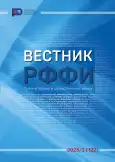Development of Writing in 21st Century for Unwritten Language of Sakhalin Ulta People: Historical Issues and Modern Solution
- Authors: Missonova L.I.1
-
Affiliations:
- N.N. Miklouho-Maclay Institute of Ethnology and Anthropology of the Russian Academy of Sciences
- Issue: No 3(122) (2025)
- Pages: 102-111
- Section: DESCRIPTION AND DOCUMENTATION OF LANGUAGES
- URL: https://journal-vniispk.ru/2587-6090/article/view/316626
- DOI: https://doi.org/10.22204/2587-8956-2025-122-03-102-111
- ID: 316626
Cite item
Full Text
Abstract
The article discusses the stages of the creation of writing, as well as the history of the sociolinguistic situation. Uilta population (according to the Censuses of the Russian Federation) does not exceed four hundred people, mostly living in the Sakhalin region. At the turn of the 1930s, the USSR started the creation of writing in native languages of "the most numerous ethnic minorities of the North." Since the Uilta (also referred to as Ulta, Oroch and Oroks in various documents of the Soviet Union) did not meet this criterion, they did not have a written language until the 21st century. Currently, there is an obvious loss of the communicative function of the Uilta language. The function of maintaining the ethnic identity of the Uilta community is now the primary one.
About the authors
L. I. Missonova
N.N. Miklouho-Maclay Institute of Ethnology and Anthropology of the Russian Academy of Sciences
Author for correspondence.
Email: missmila@iea.ras.ru
Candidate of Historical Sciences, Leading Researcher, Executive Secretary
Russian Federation, MoscowReferences
- Missonova L.I. Uil’ta vocabulary as a historical and ethnographic source / Ed. by S.A. Arutyunov. Moscow: Nauka, 2013.
- Aurorin V.A. New research on the languages of the peoples of the North // The Izvestiya of the AS of the USSR. 1957. Vol. XVI. Issue 5. pp. 472-474.
- Ikegami Jirô. A Dictionary of the Uilta Language Spoken on Sakhalin. Sapporo: Hokkai-do University Press, 1997. (in Uil’ta-Japanese)
- Magata Hisaharu (comp.). A Dictionary of the Uilta Language. Abashiri, 1981. (in Uilta-Japanese)
- Bibikova E.A., Minato Siryuko, Missonova L.I., Pevnov A.M. The primer: A textbook in the Wilt language for general education organizations. Moscow; St. Petersburg: Prosvesh-chenie, 2022. (Series "New textbook of the Far East").
- Bibikova E.A., Minato Siryuko, Missonova L.I., Pevnov A.M. Pictorial dictionary of the Uil’ta language. Grades 1-4: A textbook for general education organizations. Moscow; St. Pe-tersburg: Prosveshchenie, 2023 (Series "New Textbook of the Far East").
- Bibikova E.A., Minato Siryuko, Missonova L.I., Pevnov A.M. Uiltadairi taum-buri bichihe: Books for reading in the Uil’ta language. Moscow; St. Petersburg: Prosveshchenie, 2024. Set of (7) mini-books "Soondoo" ("Fawn"): (1) A, B, C... (ABC). Uil’tadairi taumburi bichihe. (2) 1, 2, 3 ... Geda, Duu, ilaa...One, Two, Three (Counting). (3) Buu dukupu (northern dialect), Buu duhupu (southern dialect). Our House. (4) Boo. Surrounding world. (5) Oroskoovuri. Reindeer husbandry. (6) Baie, sundattaa vaavvuri. Hunting. Fishing. (7) An-dupuri. Handi-work.
- Pevnov A.M. Linguistic evidence of historical contacts between Oroks and Orochi on Sa-khalin // Acta Linguistica Petropolitana. Proceedings of the Institute of Linguistic Research. Vol. XIV. Part 1. St. Petersburg: OR RAS, 2018. Pp. 441-464.
- Pevnov A.M. Tunguso-Manchurian languages: general information and history // Tunguso-Manchurian peoples of Siberia and the Far East: Evenki. Evens. Negidals. Uil’ta. Nanai peo-ple. Ulchi. Udege. Orochi. Tazy / Ed. by L.I. Missonova, A.A. Sirina. Moscow: Nauka, 2022. (Series "Peoples and Cultures"). Pp. 58-72.
- Pevnov A.M. Etymology of the self-designation of the Oroks // Acta Linguistica Petro-politana. Proceedings of the Institute of Linguistic Research. Vol. XIII. Part 3. St. Petersburg: Nauka, 2017. Pp. 886-892.
- Novikova K.A., Sem L.I. The Orok language // Languages of the world: Mongolian lan-guages. Tungusic-Manchu languages. Japanese language. The Korean language, Moscow, 1997. Pp. 201-215.
- Sanzheev G.D. Education and development of national languages in the light of the teach-ings of I.V. Stalin // Questions of linguistics in the light of the works of I.V. Stalin / Ed by V.V. Vinogradov. Moscow: Moscow State University, 1952.
- S. Leontovich (comp.) A short Russian-Orochen dictionary with a grammatical label. The dialect of the Tumnin River basin, which flows into the Tatar Strait, north of the Imperial Harbor / Notes of the Society for the Study of the Amur Region of the Branch Department of the Amur Department of the Imperial Russian Geographical Society. Vol. V. Issue II. Vladi-vostok: Type. N. V. Remezova, 1896.
- Pilsudski B. From a trip to the Oroks of Sakhalin in 1904. The preprint. Yuzhno-Sakhalinsk, 1989.
- Petrova T.I. The language of the Oroks (Ul'ta). L.: Nauka, 1967. [Petrova T.I. "A gram-matical sketch of the Orok language. (Morphology). Dissertation [B. N. B. G.]. Leningrad State University" / Scientific Library of St. Petersburg State University.
- Ozolinya L.V. Orok-Russian dictionary / Ed. by B.V. Boldyrev. Novosibirsk: Publishing House SB RAS, 2001.
- Sem Yu.A., Sem L.I., Sem T.Y. Materials on traditional culture, folklore and the Orok lan-guage. Dialectological Orok-Russian dictionary // Proceedings of the Institute of History, Ar-cheology and Ethnography of the Peoples of the Far East. Vol. XIV. Ethnographic research. Vladivostok: Dalnauka Publ., 2011.
- Comparative dictionary of the Tungusic-Manchurian languages. Materials to the etymo-logical dictionary / Ed. by V.I. Tsincius. L.: Nauka. Vol. I.1975. Vol. II. 1977.
- Skorik P.Ya. The main trends in the development and interaction of the languages of the peoples of the North // The main processes of intra-structural development of the Turkic, Fin-no-Ugric and Mongolian languages / Ed. by N.A. Baskakov, M., 1969.
- Okladnikov A.P. Petroglyphs of the Lower Amur. L., 1971.
- Bogoraz V.G. The Luoratvetlansky (Chukchi) language // Languages and writing of the peoples of the North. M.; L., 1934. Part III.
Supplementary files









